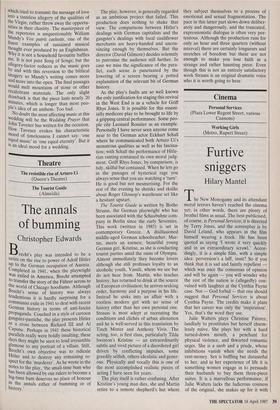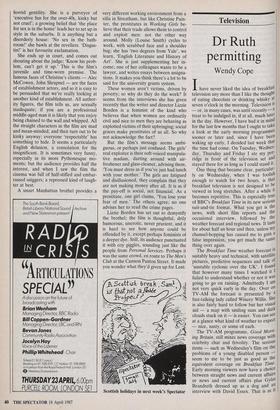Cinema
Personal Services (Plaza Lower Regent Street, various Cannons) Working Girls (Metro, Rupert Street)
Furtive sniggers
Hilary Mantel
The New Monogamy and its attendant moral terrors haven't reached the cinema yet; in other words, there are plenty of brothel films as usual. The best-publicised, of course, is Personal Services; it is directed by Terry Jones, and the screenplay is by David Leland, who appears in the film himself wearing a frock. He has been quoted as saying 'I wrote it very quickly and in an extraordinary scrawl.' Accor- dingly, it is a simple film, with a simple idea: perversion's a laff, innit? So if you think that it is sad and faintly repellent which was once the consensus of opinion and will be again — you will wonder why the rest of the nation is (allegedly) con- vulsed with laughter at the Cynthia Payne case. Not — God forbid — that one should suggest that Personal Services is about Cynthia Payne. The credits make it plain that her career was only the 'inspiration'. Yes, that's the word they use.
Julie Walters plays Christine Painter, landlady to prostitutes but herself charm- lessly naive. She plays her with a hard turned-down mouth, a penchant for physical violence, and thwarted romantic urges. She is a snob and a prude, whose inhibitions vanish when she needs the rent-money. Sex is baffling but distasteful to her, and in her experience of life it is something women engage in to persuade their husbands to buy them three-piece suites. It is a marvellous performance; if Julie Walters lacks the ludicrous cosiness of the original, she makes up for it with horrid gentility. She is a purveyor of `executive fun for the over-40s, kinky but not cruel'; a growing belief that 'the place for sex is in the home' leads her to set up in style in the suburbs. It is anything but a disorderly house: 'No sex in the bath- room!' she bawls at the revellers. Disgus- tin!' is her favourite exclamation.
She ends up in court, and comes out shouting about the judge; 'Know his prob- lem, can't get it up.' This is the film's juvenile and time-worn premise. The famous faces of Christine's clients — Alec McCowen, John Shrapnel — are the faces of establishment actors, and so it is easy to be persuaded that we're really looking at another kind of establishment. All author- ity figures, the film tells us, are sexually inadequate; if you are a professional middle-aged man it is likely that you enjoy being chained to the wall and whipped. All the straight characters in the film are mad and mean-minded, and then turn out to be kinky anyway; everyone 'respectable' has something to hide. It seems a particularly English delusion, a consolation for the insignificant. It is sometimes very funny, especially in its more Pythonesque mo- ments; but the audience provides half the interest, and when I saw the film the cinema was full of half-stifled and embar- rassed sniggers; a repressed kind of laugh- ter at best.
A smart Manhattan brothel provides a very different working environment from a villa in Streatham, but like Christine Pain- ter, the prostitutes in Working Girls be lieve that their trade allows them to control and exploit men: not the other way around. Molly (Louise Smith) cycles to work, with scrubbed face and a shoulder bag; she has 'two degrees from Yale', we learn, 'English Literature and History of Art'. She is just supplementing her in- come; one of her colleagues wants to be a lawyer, and writes essays between assigna- tions. It makes you think there's a lot to be said for the university grants system.
These women aren't victims, driven by poverty; so why do they do the work? It seems from the interviews she has given recently that the writer and director Lizzie Borden is a feminist of the kind who believes that when women are ordinarily civil and nice to men they are behaving as exploited victims of their upbringing; social graces make prostitutes of us all. So why not acknowledge the fact?
But the film's message seems ambi- guous, or perhaps just confused. The girls' real exploiter is their soft-voiced manipula- tive madam, darting around with air- freshener and glass-cleaner, advising them, 'You must dress as if you've just had lunch with your mother.' The girls are fatigued and disillusioned, they complain that they are not making money after all. It is as if the pay-off is social, not financial. As a prostitute, one girl claims, 'You lose your fear of men.' The others agree; no one advises her to read the crime pages.
Lizzie Borden has set out to demystify the brothel; the film is thoughtful, drily humorous, unerotic, never prurient, and it is hard to see how anyone could be offended by it, except perhaps feminists of a deeper dye. Still, its audience punctuated it with coy giggles, sounding just like the people from Personal Services. Perhaps it was the same crowd, en route to The Men's Club at the Cannon Panton Street. It made you wonder what they'd given up for Lent.
Scottish holidays in next week's Spectator



















































 Previous page
Previous page